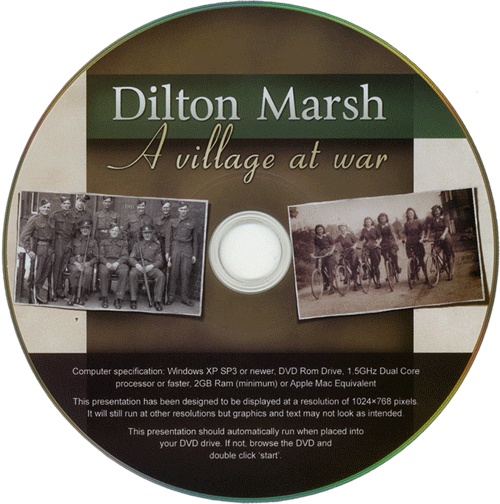

The “A Village at War “ CDs
The “A Village at War “ CDs are now available from Graham Noble and are free of charge. This of course will be on a first come first served basis.
I am available on g.rc.noble at btintetrnet.com and phone contact is 01373 858561.
CDs will also be available at our next talk.
Evacuees
Britain declared war with Germany on 3rd September 1939 and on The 4th September Schools closed for a week. This was while the evacuation of children from Lo don was organised.
The schools re-opened on 1th September 1939 and 10 evacuees were admitted. There followed more arrivals over the next few months (the Infant school log details these arrivals).
The evacuees usually arrived by train at Westbury station and were met by Harry Millard and his charabanc, and brought to Dilton Marsh.
Allen Blair remembers his arrival in 1940, recalling they arrived late –about 10.30 pm and were loaded onto Harry Millard’s coach for the journey to Dilton Marsh. They had been sent out of London with very little notice as the bombing had started. They left London with their gas masks around their necks and a pack of sandwiches in their hand, boarding a train at Paddington in the dark not knowing where they were going.
On arrival in Dilton Marsh, tired, scared and hungry they were hustled into the church, which had a blanket over the door for blackout, sat down and were given tea by the WVS ladies. Some of the teachers had accompanied the children out of London.
Suddenly, lots of women came scampering through the door into the church as though it was the first day of the sales, and started grabbing and holding onto what they considered was their choice of a boarder, disappearing out into the night with children in tow while the vicar smiled and ticked names off his list. Those who were with siblings and to be kept together were the last to go.
Life was very strange and different for these London children as most had never been to the country before and had no experience of livestock or hooting owls etc. They were very much more streetwise than the local children and there were some behavioural problems at first, not to mention scabies and fleas, but most settled in well and soon made friends. Some of the mothers followed and took lodgings in the area.
Joseph Wickes was evacuated to Penleigh Farm with his mother following. He says that being evacuated to a farm to live with a wonderful family was so lucky for him and his mother. The farm had chickens and ducks as well as dairy cows so there was always fresh eggs and milk. He and his mother helped with fruit picking and the making of jams and pickles.
Some local families had relatives living in London who decided to move down to Dilton Marsh to lodge with family for safety. This is what happened to Margaret Grants family, although unfortunately her aunty VI chose to send her two children to Canada on the evacuee ship “The City of Benares”. The ship left Liverpool on 12th September 1940 and was sunk by torpedoes 500 miles off the Irish Atlantic coast. Her two cousins were among the 90 children lost.
The Cowen sisters, Eva and Vera, were billeted with the Blewetts at 1 Clearwood. They were very good at art and Mr Blewett let them paint a cockerel and hens etc. on his hen house. The finished painting was very good and villagers used to take their Sunday walk down Stormore to have a look.
John Wordsley, a very tall blonde boy, lodged with Mrs. Freeguard at 14 Stormore and Sheila Nottle with Mr and Mrs Pearce on their farm.
The landlord of the Prince of Wales, Bill Bailey, took in twin boys called Pearce.
A girl called Anne Passmore went to live at the grocery shop by the green.
Lily Carter remembers the evacuees didn’t like the smell of the farms and didn’t know that milk came from cows or anything about a lot of things such as what strawberries were. A lot of them didn’t stay long. She remembers one boy called Tony Turone had to go back to London when he turned 15 so he could earn money for his family, and was killed; but John Bishop remembers that he was a burglar and gangster in later years, so what really was the cause of his death is uncertain!
Joan Freeguard remembers a boy called John Wordsley staying with her family for several years and later visited them, even bringing his family to meet them because he had been so happy here.
